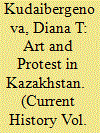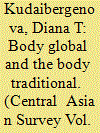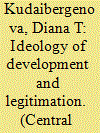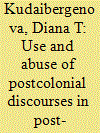| Srl | Item |
| 1 |
ID:
187620


|
|
|
|
|
| Summary/Abstract |
Recent events in Kazakhstan show that political art has the potential to be a potent form of protest in some of the most authoritarian states in contemporary Central Asia. After the collapse of the Soviet Union, artists in Kazakhstan and elsewhere in the region began turning away from the canon of Socialist Realist art, with its sole aim of serving the regime and depicting its visions of the future. New forms of contemporary art emerged, drawing sharp contrasts with official art in form, content, and culture, as more artists insisted on freedom from state patronage and control. In the political upheaval following the resignation of long-ruling President Nursultan Nazarbayev, artists have inspired protests with pointed critiques.
|
|
|
|
|
|
|
|
|
|
|
|
|
|
|
|
| 2 |
ID:
168831


|
|
|
|
|
| Summary/Abstract |
What is the power of social media in defining and policing sexual identities and bodily expressions, and what are their connections to understanding nation, power and self in authoritarian contexts? Through the study of popular Instagram accounts in Kazakhstan and Russia, I argue that these sites serve as spaces of visualization and re-creation of new forms of ‘acceptable’ behaviour and lifestyles, that on the one hand may lead to new globalized visions of sexual identity and the body while on the other promoting localized conflict and resentment online, triggered by online users’ fear of losing their ‘national culture’ in these global trends. While many resort to policing gender norms and heteronormative body images online, influencers and Instagrammers from Russia and Kazakhstan take an active part in resisting these frameworks and categories.
|
|
|
|
|
|
|
|
|
|
|
|
|
|
|
|
| 3 |
ID:
142620


|
|
|
|
|
| Summary/Abstract |
The paper analyses the multifaceted discourse of development and nation-building in post-Soviet Kazakhstan. It addresses the regional clan–central elite relations and Nursultan Nazarbayev regime's legitimating agenda through the Kazakhstan 2030 Strategy for development. The economic developmental component in Nazarbayev's ideological discourses is primarily an exercise of control over regional economic and political elites and that helped building further legitimacy for the regime in various socio-ethnic constituencies on both the regional and central levels. Kazakhstan 2030 was deployed by the regime to substitute the Soviet version of ideology, legitimize the regime among various ethno-lingual audiences, and discipline the behaviour of regional elites. The paper shows how the study of elites’ interests can best explain the nature of national ideology and development projects.
|
|
|
|
|
|
|
|
|
|
|
|
|
|
|
|
| 4 |
ID:
146766


|
|
|
|
|
| Summary/Abstract |
The article explores the concept of political postcolonialism and how political groups appropriate and contest this discourse. Elites and contesting political groups utilise postcolonial rhetoric to legitimate their political goals by projecting that their country, in this case Kazakhstan, was colonised by the Tsarist Russia and then by the Soviet Union. For President Nursultan A. Nazarbayev’s nationalising regime the status of Kazakhstan as a colony represented a vital item in post-1991 nation-building projects. Political opposition and Kazakh national-patriots contested this official discourse, blaming the regime for scarce efforts towards ‘full decolonisation’. The absence of major intellectual discussion allowed these elites and political players to reappropriate these discourses in the political rather than critical intellectual domain.
|
|
|
|
|
|
|
|
|
|
|
|
|
|
|
|